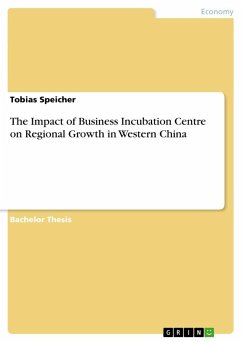Bachelor Thesis from the year 2010 in the subject Business economics - Economic Policy, grade: 2,2, University of Applied Sciences Bremen (School of International Business), course: Applied Business Languages and International Business Management (B.A.) - Chinese , language: English, abstract: China's regions face huge gaps in economic development, especially the western provinces lack far behind the coastal provinces due to uneven political attention in the process of China's run for becoming an industrial nation in the past decades and its location in the hinterland of the country. Since the beginning of the new millennium China's western region receives special attention by the central government in terms of economic development. The main reason is that the population in China's underdeveloped west is more and more unsatisfied with its situation. The eastern provinces and coastal regions have reached a relatively high level of development while a greater part of the western rural regions are underdeveloped, generating growth rates which cannot compete with those of the East and having no means to foster development on their own. During the prior 20 years the disparities between China's West and the East were increasing entailing the thread of social instability and riots which is something the government in Beijing fears most. Regional growth received tremendous scientific attention since the middle of the 20th century which resulted in various approaches and theories. Different patterns have been developed to artificially generate growth. Due to the observations made in the American Silicon Valley and northern Italy, where agglomeration of industries caused sustainable regional growth, the model of business incubation and technology parks was developed. Since then governments all over the world, from developed industrial nations as well as from emerging nations and developing countries, adapt this model to attract foreign direct investment (FDI), steer investment and foster regional growth in areas where it is demanded. Although business incubation centers are popular among policy makers, scholars have a critical attitude towards incubators and their outcome and doubts have been raised about their effectiveness as a regional development tool. Among the reasons for criticism is the fact that their growth has occurred due to attraction of firms from outside their host region rather than through the formation of new firms. One of the main questions this thesis is trying to give an answer to is: Are Business Incubation Centers and Science and technology parks a suitable tool to foster economical growth in Western China?
Hinweis: Dieser Artikel kann nur an eine deutsche Lieferadresse ausgeliefert werden.
Hinweis: Dieser Artikel kann nur an eine deutsche Lieferadresse ausgeliefert werden.








